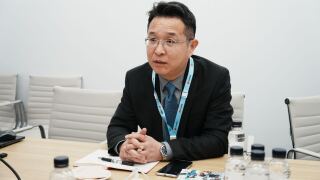But Guy Arnos had a bad tributary slot in the muxponder card that was essential to test the newly-laid cable. He didn’t have replacements, because they had been tied up in customs for three weeks.
The nearest alternative was a week away by Angola’s potholed roads, and was already installed in another part of the network. So they yanked it out, put it in a car, and drove it over.
Arnos works for WFN Strategies (WFNS), telecoms engineering consultants who are accustomed to working at what one of his colleagues has nicknamed “the edge of electricity.” WFNS’s Angolan project is the Adones submarine cable system, constructed by Ericsson and operated by incumbent Angola Telecom, which runs from the mouth of the River Congo to Namibe in the south. It brings capacity to eight rapidly-growing coastal cities. Luanda alone has a population of five million, packed with refugees from a 27-year civil war which didn’t finish until 2002.
Adones is part of the reconstruction of Angola’s shattered infrastructure. Only a quarter of Angola’s roads are paved, and outside Luanda it’s still impossible to travel without four-wheel drive. Meanwhile in Luanda, it often took Arnos’ team two and a half hours to drive 15km from hotel to site. Arnos says that the development of Africa offers “a new and more concentrated version” of the daily snafus he first encountered laying cables for MCI in 1980s Texas. The most important lesson that he has learned is, if you need spares, be prepared to improvise or wait. “I’m used to a mean time to repair of four hours in the US. In Angola I’d be lucky to have a repair time of two days. You have to design your network with maintainability in mind from the beginning: build extra redundancy and resiliency.”
The problems, as in much of sub-Saharan Africa, are accentuated by bureaucratic hold-ups. In the developing world, there’s no guarantee of when equipment will be repaired or how much duty – official and unofficial – you may need to pay along the way.
Arnos never saw his missing muxponders. When customs officers learned to recognise his cellphone number and stopped taking his calls, he would borrow a handset so he could get through to try to retrieve his equipment. A month later he left the country with the job completed but with the cards – which belonged to the state-owned telephone company – still bound up in red tape.
Yet the rebuilding of Angola is becoming one of the successes of global redevelopment, not just in Africa, and Arnos has nothing but praise for the Angolans he worked with who know how to solve any problem through cleverness and perseverance.
Tim Phillips can be contacted at: tim@timphillips.co.uk




